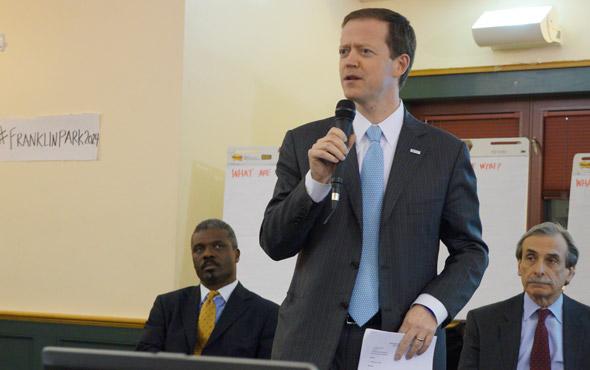March 6, 2015

Richard Davey talks as Rev. Jeffrey Brown (l) and architect David Manfredi listen.
The CEO of the private group trying to bring the 2024 Olympics to Boston says the games could mean permanent improvements to Franklin Park, where the group wants to host equestrian events and the pentathlon.
But a number of residents from Dorchester, Roxbury and Jamaica Plain expressed skepticism about those benefits Thursday evening, at a packed meeting called by the Franklin Park Coalition and the Emerald Necklace Conservancy at the Franklin Park golf course's clubhouse.
Among those in attendance: Former Gov. Deval Patrick, who sat in the back and did not speak.
Boston 2024 CEO - and former state transportation secretary - Richard Davey said one of the key enhancements proposed for Franklin Park would be a new, permanent swimming pool, next to White Stadium, which itself would undergo a major renovation as a venue for both the pentathlon and for equestrian events.
The pool is required for the pentathlon, a competition involving five sports, including swimming and shooting - which Boston 2024 architect David Manfredi emphasized is done with lasers, not bullets.
But residents questioned who would maintain the pool in a park that already has a major backlog of issues, or even if a park designed as bucolic slice of country in the middle of a city really needs another concrete structure to go with all the other structures that have eroded Olmsted's original vision over the decades.
No problem, Davey replied: If residents really object to a permanent pool, organizers could put in a temporary one - and figure out another way to improve the park.
Ricardo Dumont, a landscape architect hired by Boston 2024, said other benefits could include restoration work to a stream and nearby areas in the park's southernmost section. Some residents, however, took issue with Dumont's admission he was completely unfamiliar with Franklin Park before Boston 2024 hired him.
Davey and Manfredi discussed in broad terms how they saw Franklin Park fitting into the Olympics: White Stadium would get an overall redo that would include temporarily increasing its capacity to 20,000 seats, while grassy, non-fairway parts of the golf course would be turned into a course for equestrian races.
Manfredi said the stadium and the fields around it might have to be closed off to the public for up to a year to allow for construction. In contrast, the golf course would only have to be shut for about a month, he said.
Some residents objected to the idea of a bunch of rich people on horseback effectively barring park neighbors and other Boston residents from the park for long periods and questioned whether the events could be simply held some place else.
Davey acknowledged the initial plan approved by the US Olympic Committee was really a "proof of concept" more than a concrete final plan and that Boston 2024 is already considering venue changes - he noted similar opposition to a beach-volleyball stadium on the Common.
When one resident asked about the potential traffic impact on Blue Hill Avenue, Davey got the biggest laugh of the night when he said organizers will be trying hard to convince Olympic participants and spectators to take the T.
Former state Sen. Dianne Wilkerson, who lives near the park, said she's concerned about displacement of poor residents living near venues; in fact, she said she's currently working on a master's thesis on the topic of displacement in Olympic host cities. She said both London and Beijing moved large numbers of residents to make way for their games and that in Atlanta, 30,000 people were forced to move.
"What we get [from the Olympics], hopefully, is we get to stay in our homes," she said.
She added she's also concerned about ensuring local minority- and women-owned businesses get a fair shot at Olympics business.
The Rev. Jeffrey Brown, working on community outreach for Boston 2024, spoke in more general terms about the importance of bringing the Olympics to Franklin Park. "Sport has a power to bring people together," he said. And the Olympics bid "starts a conversation that builds a city that we would all like to see in the future."
Davey said residents should take heart that even if Boston doesn't get the 2024 games, the current planning will leave Boston a better place because that planning involves a deep look at what residents want their city to be in 20 or 30 years.
One resident retorted that "feels a little bit like extortion" - as if residents cannot expect any improvements at all in the city unless the Olympics are forced down their throats.
Davey said he has taken no position either for or against City Councilor Josh Zakim's proposal for four referendum questions on the Olympics. However, he said that just based on the discussion tonight, the issues are "a lot more complicated than yes/no."
Not everybody opposed either the Olympics in general or using Franklin Park for it in particular - with some saying they've yet to make up their minds. One man said that as a White Stadium neighbor and former figure skater, he can't wait to see Olympics events there - and the improvements to the park that would come afterward.
Tags:


